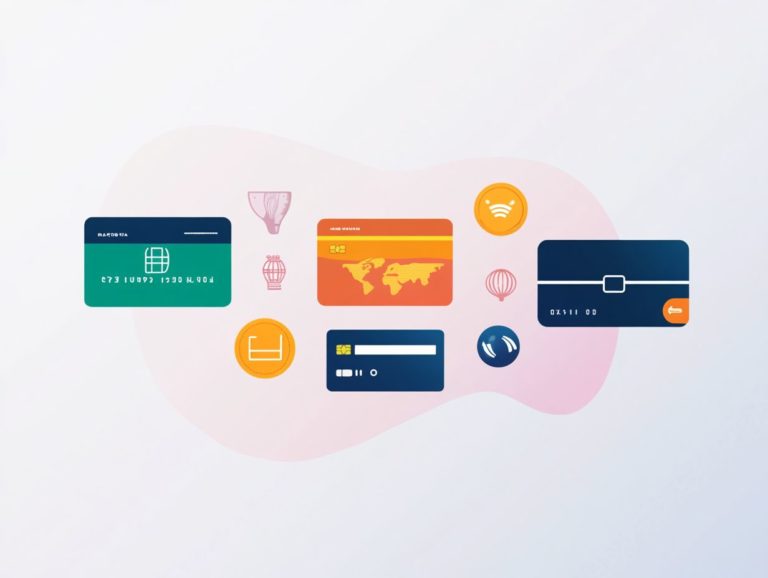5 Best Credit Card Features for Students
Navigating the world of credit may feel overwhelming as a student, but selecting the right credit card can truly transform your experience.
This article delves into five essential features to seek in a student credit card, including low or no annual fees and rewarding programs that enhance your everyday spending.
It also covers potential pitfalls, strategies for building a strong credit profile, and invaluable tips for responsible credit use.
Prepare to take charge of your financial journey with confidence!
Contents
- Key Takeaways:
- 1. Low or No Annual Fees
- 2. Rewards Program for Everyday Purchases
- 3. Introductory APR
- 4. Credit Education Resources
- 5. No Credit History Required
- What Are the Benefits of Having a Credit Card as a Student?
- Frequently Asked Questions
- What are the 5 best credit card features for students?
- Which credit cards offer low or no annual fees for students?
- Do any credit cards for students provide cashback rewards?
- Are there credit cards for students with no foreign transaction fees?
- How can a credit card help a student build their credit?
- What kind of fraud protection do credit cards for students offer?
Key Takeaways:

Low or no annual fees make credit cards more accessible for students.
A rewards program for everyday purchases can help students save money or earn extra perks.
An introductory APR can provide students with a low or 0% interest rate for a certain period of time.
1. Low or No Annual Fees
When you’re exploring student credit card options, one of the most enticing features is the availability of low or even no annual fees. Additionally, considering the 5 best rewards cards for students in 2024 can make it much easier to manage your finances while studying without the added stress of unnecessary costs.
This aspect lightens the load of potential debt and fosters responsible spending habits. For example, options like the Discover it Student Cash Back card and the Bank of America Travel Rewards for Students are excellent choices. If you’re considering traveling abroad, check out the 5 best travel credit cards for students abroad which have minimal fees. This allows you to concentrate on building your credit history rather than fretting over hefty charges.
By steering clear of high annual fees, you can maintain a healthier credit utilization ratio, which reflects how much credit you re using compared to your total credit limit. This is vital for your overall financial stability. In this way, you ll learn to budget and allocate your funds more efficiently, setting the stage for long-term fiscal responsibility and prosperity.
2. Rewards Program for Everyday Purchases
Many student credit cards offer enticing rewards programs that allow you to earn cash back or points on your everyday purchases. Exploring the best rewards credit cards for students can enrich your financial journey as you learn the ropes of responsible credit usage.
These programs align with your typical student expenses think groceries, gas, and dining out making it easy for you to reap the benefits of your spending habits. For example, cards like Capital One provide rewards that let you earn a percentage back on these essential categories. Not only does this help you save money, but it also fosters sound financial habits.
By utilizing these rewards effectively, you can turn everyday expenses into opportunities to build your credit history. To maximize your benefits, consider making small, manageable purchases on your credit card and paying off the balance in full each month. This strategy helps you rack up rewards and avoid debt what’s not to love?
3. Introductory APR
An introductory APR presents you with a unique opportunity to manage your finances effectively as a college student. With a lower interest rate during the initial months of your student credit card, you re encouraged to use credit responsibly.
This feature allows you to make necessary purchases or handle unexpected expenses without the immediate burden of high interest rates. By taking advantage of popular student credit cards that typically offer attractive introductory APRs, you can establish a solid credit history essential for future financial endeavors, like applying for car loans or securing an apartment. Additionally, consider exploring unique credit card features that you’ll appreciate.
It’s crucial to understand the timeline of the introductory period; knowing when it expires gives you the power to strategize your monthly payments. Act now to take full advantage of low interest rates before they expire! By planning ahead and ensuring your payments are made before the introductory period ends, you can avoid accumulating debt at a higher interest rate, ultimately fostering a healthier financial future.
4. Credit Education Resources

Credit education resources are critical for college students. They provide essential guidance on how to build credit early and understand credit history a factor that can profoundly influence their financial future and personal finance decisions.
By actively engaging with these resources, you can gain insights into budgeting, saving, and managing debt. Workshops and online courses cater to young adults, equipping you to make informed financial choices.
Credit bureaus offer services to monitor your credit report and score regularly. This keeps you informed about your financial standing. By leveraging these tools and tips, you can elevate your financial literacy and implement effective credit management strategies that set you up for success.
5. No Credit History Required
One of the significant advantages of student credit cards is that many don t require a prior credit history. This allows you as a college student to start building credit early, even without established financial accounts.
This inclusivity opens the door for students from various economic backgrounds to utilize credit-building tools like secured credit cards, which often demand only a modest upfront deposit as collateral. Typically, you ll need to show a steady income, whether from part-time jobs or financial support from family, ensuring that even those in lower-income situations can qualify.
These cards come with student-friendly perks, such as cash back on groceries or discounts on books. Additionally, understanding the essential features for travel credit cards can enhance your financial flexibility. In fact, these credit opportunities can serve as important steps toward securing personal loans, qualifying for rental apartments, and establishing a solid financial foundation for your future.
What Are the Benefits of Having a Credit Card as a Student?
Having a credit card as a student opens up a world of benefits for you. Don’t miss the chance to build your credit early; this could change your financial future! You can enhance your financial habits and establish a positive credit score by understanding 5 essential features in travel credit cards. This foundation can be crucial for future financial pursuits, such as securing personal loans or renting an apartment.
By handling a student credit card responsibly, you can gradually create a robust credit history that will serve you well later in life. This journey not only gives you the power to make informed financial decisions but also equips you with essential budgeting and expense management skills.
Many credit card providers offer rewards for your purchases, allowing you to earn cashback or points that can be redeemed for shopping, travel, or memorable experiences. As you establish a history of timely payments, you may discover that issuers are more inclined to increase your credit limits or offer lower interest rates, significantly enhancing your financial landscape as you transition into adulthood.
What Are the Risks of Having a Credit Card as a Student?
While having a credit card as a student can offer solid advantages, it’s essential to recognize the risks involved. Understanding the features that differentiate credit cards can help you avoid falling into debt due to high interest rates, facing the risk of fraud, or racking up excessive fees.
These pitfalls can spiral out of control if not managed with care. Understanding credit utilization rates this is the ratio of your credit card balance to your credit limit is vital. Keeping your balance low relative to your credit limit can significantly impact your overall credit score. Be cautious about overspending; high utilization can signal financial distress and lead to lower scores.
To sidestep common mistakes, consider setting a monthly budget for your credit card use, ensuring that your payments remain manageable.
Regularly monitoring your account transactions can help you catch any fraudulent charges early, adding an essential layer of security against unexpected debts.
How Can Students Build and Maintain Good Credit?

Building and maintaining good credit as a student requires understanding responsible credit usage. Monitor your credit report and foster healthy financial habits for long-term credit success.
To embark on this important journey, prioritize making timely monthly payments for all your bills and credit obligations. Keeping your credit card balances low improves your credit utilization ratio, which is the amount of credit you re using compared to your total credit limit.
Consider credit-building tools like student credit cards or secured cards. These options can help you establish a positive credit history. Regularly checking your credit reports is essential; it allows you to verify the accuracy of your information and spot discrepancies that might negatively impact your credit profile.
By following these straightforward strategies, you can cultivate a robust credit history that opens doors to future financial opportunities.
What Are the Common Misconceptions About Student Credit Cards?
There are many common misconceptions surrounding student credit cards. Some believe they are only available to those with an established credit history or that they inevitably lead to debt, hindering responsible credit usage.
In fact, these credit cards are specifically designed for individuals starting their financial journeys. They are accessible even to those without prior credit experience. While mismanagement can lead to burdensome debt, using these cards responsibly can enhance your credit profile and provide essential financial safety nets.
It s vital to understand the benefits and risks associated with credit management. By increasing your financial literacy and seeking trustworthy sources of information, you empower yourself to navigate the complexities of credit cards effectively.
Making well-informed decisions will support your long-term financial well-being.
How Can Students Compare and Choose the Right Credit Card for Them?
To find the right credit card, actively compare various student credit card offers. Consider key factors such as interest rates, rewards programs, and top features to look for in a credit card that align with your financial situation.
Diving deep into the specific terms and conditions associated with each card is essential, as these can vary significantly and impact your overall costs. Often, you might be tempted by alluring rewards but overlook hidden fees that could negate those benefits.
Evaluating how your current financial behavior like spending habits and payment history affects your approval odds will empower you to make a wise choice.
Seek practical tips, such as maintaining a low credit utilization ratio and regularly reviewing your credit reports. These steps will help you maximize your chances of securing a card that meets your immediate needs while supporting your long-term financial aspirations.
What Are Some Tips for Responsible Credit Card Use as a Student?
Practicing responsible credit usage is essential for students. By implementing effective strategies such as setting budgets, making timely payments, and monitoring your credit utilization rate, you can establish a solid foundation for future financial success.
Avoid impulsive purchases that threaten to derail your financial plans. Utilizing auto-pay features can help ensure your payments are made on time, alleviating the stress of missed deadlines.
Regularly reviewing your credit card statements allows you to spot unauthorized charges and provides valuable insights into your spending habits. Crafting a comprehensive budget that includes credit card expenses is crucial to prevent unnecessary debt from piling up.
Ultimately, these habits not only promote responsible financial behavior but also play a significant role in maintaining a healthy credit score. This score is vital for future endeavors, whether applying for loans or renting an apartment.
Frequently Asked Questions

What are the 5 best credit card features for students?
Here are the top five credit card features for students:
- Low or no annual fees
- Cashback rewards
- No foreign transaction fees
- Opportunities to build credit
- Fraud protection
Which credit cards offer low or no annual fees for students?
Here are some credit cards with low or no annual fees for students:
- Discover it Student Cash Back
- Bank of America Cash Rewards Credit Card for Students
- Journey Student Rewards from Capital One
Do any credit cards for students provide cashback rewards?
Absolutely! Many student credit cards offer cashback rewards. For example, check out:
- Discover it Student Cash Back
- Citi Rewards+ Student Card
- Bank of America Cash Rewards Credit Card for Students
Are there credit cards for students with no foreign transaction fees?
Yes, some credit cards for students have no foreign transaction fees. Notable options include:
- Capital One QuicksilverOne Cash Rewards Credit Card
- Bank of America Travel Rewards Credit Card for Students
How can a credit card help a student build their credit?
A credit card can help a student build their credit by:
- Establishing a credit history
- Making on-time payments
- Keeping credit utilization low
Some cards even come with fantastic credit-building tools that report to credit bureaus, making it easier for you to boost your score!
What kind of fraud protection do credit cards for students offer?
Credit cards for students offer fraud protection through:
- Monitoring for suspicious activity
- Providing zero liability for unauthorized charges
- Offering fraud alerts and chip technology to prevent fraudulent transactions






